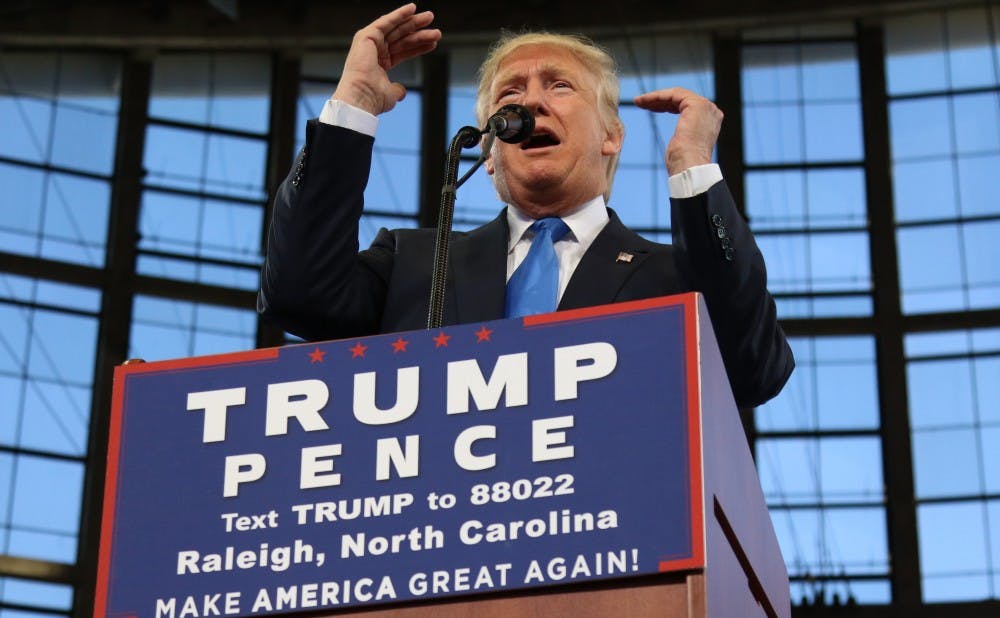The midterm elections are over, and we’re left with what most expected: a Democratic House, a Republican Senate, and an overwhelmingly divided government. While gridlock ensues, President Trump will continue to roll through the judicial appointments as Democrats in the House will seek to investigate everything from his tax returns, to supposed collusion with Russia, and maybe even his past romantic ties to porn stars.
The national politics we see today are unique to our lifetime. The mudslinging hasn’t been this bad since Adams and Jefferson, and CNN, MSNBC and Fox seem to always be reporting the news like a reality TV drama. For better or worse depending on your views, Donald Trump has truly reshaped and intensified American politics.
What do voters think of Trump’s presidency so far? The midterm elections hold part of the answer, but until 2020, assuming that he is not impeached and subsequently convicted, we won’t get a full picture. Nevertheless, these midterms were historic, and the evidence suggests that Trump, despite most of the media’s and liberal America’s ardent dislike of his policies and personality, might have better standing with the public than some of us may suspect.
Yes, the Democrats did reclaim majority representation in the House after eight years. They also showed they could succeed in suburban districts and win in former Republican strongholds. In 2020, Republicans will need to carry out a stronger message to suburban districts as these districts continue to grow in population and will continue to carry more weight in terms of percentage of a state’s population.
However, as even liberal commentators acknowledged, the midterms were anything but a so-called blue wave. The Republicans lost fewer seats than Democrats did in both Clinton and Obama’s first midterm election, and both of those presidents went on to be re-elected by substantial margins. In 2010, Republicans gained 63 seats in the House and picked up six seats in the Senate and six gubernatorial positions. In 2018, Democrats of gained somewhere over 30 House seats (some races remain undecided), but Republicans were able to unseat incumbent Democrats in the Senate, particularly those in battleground states who voted against Justice Kavanaugh’s confirmation.
After all races are officially called, it is possible that Republicans will end up expanding their majority in the Senate. Historically, the party that does not have the White House performs better, and 2018 was consistent with this trend to a lesser extent than recent midterms. However, a good sign for Republicans is that the president’s party has gained Senate seats while losing House seats in a midterm only three times in the past 104 years. Since World War II, the sitting president’s party loses an average of 37 House seats in midterm elections. This historical data would indicate that Trump and Republicans may have actually outperformed historical standards.
President Trump is certainly an outlier and should not be judged solely on a statistical basis. However, given the Democratic framing of the midterms being a referendum on Trump as well as Democratic voter enthusiasm based on a strong distaste for the president, it is significant that the midterms were not an outright rebuke of the current administration. The overall power shift suggests that Trump still has an energized base and will not go down as easily as some would hope. An October WSJ/NBC survey even indicates that, compared to recent presidents, many voters (20 percent) approve Trump’s policies although they dislike him personally.
Furthermore, President Trump can now strategically blame the House Democrats for any future policy failures and the inability to push certain parts of his agenda. Many Republicans are even licking their chops because they see Nancy Pelosi as a deeply flawed politician who is prone to gaffes.
A major source of optimism for Republicans comes from the fact that they avoided disaster for the most part. Yes, despite his loss Beto O’Rourke exceeded expectations, but we need to take his race in its context. On top of Ted Cruz being a flawed candidate given his ambiguous relationship with the both Trump and the party, Democratic donors also funneled an unprecedented $70 million in funding into O’Rourke’s campaign. Additionally, it’s worth noting that incumbent Republican Governor Greg Abbott still won by a healthy margin. Until we see otherwise, Texas is still red.
Republicans also have another chance to tweak their message and focus on selling economic growth as a key reason to remain in power. A WSJ/NBC poll suggests that voters are remarkably satisfied with the economy, and this could certainly be winning message for Republicans to energize conservatives and appeal to moderates if it remains the focus of the Republican platform. Doubling down on issues like immigration will have a narrower, more divisive appeal that may not attract a broader base.
Nonetheless, Democrats and Republicans do have issues they can work together on. Depending on how the courts handle DACA, President Trump may be able to hammer out a deal that includes wall funding for a legislative solution to the program. Infrastructure spending and drug pricing reform can also be areas in which Congress and the President make progress.
This column is not an endorsement of the president and his administration, but rather my interpretation of why Republicans can be optimistic based on the evidence. Even with a mixed verdict, the bottom line is that President Trump and Republicans are certainly in position to reclaim power in 2020.
Mitchell Siegel is a Trinity junior. His column, Truth Be Told, usually runs on alternate Thursdays.
Get The Chronicle straight to your inbox
Signup for our weekly newsletter. Cancel at any time.
Mitchell Siegel is a Trinity sophomore. His column, "truth be told," runs on alternate Wednesdays.

